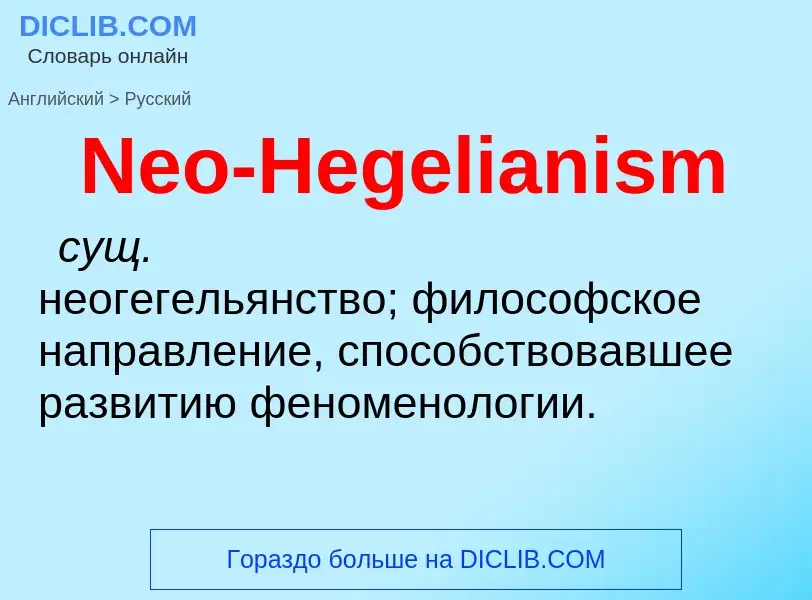Übersetzung und Analyse von Wörtern durch künstliche Intelligenz ChatGPT
Auf dieser Seite erhalten Sie eine detaillierte Analyse eines Wortes oder einer Phrase mithilfe der besten heute verfügbaren Technologie der künstlichen Intelligenz:
- wie das Wort verwendet wird
- Häufigkeit der Nutzung
- es wird häufiger in mündlicher oder schriftlicher Rede verwendet
- Wortübersetzungsoptionen
- Anwendungsbeispiele (mehrere Phrasen mit Übersetzung)
- Etymologie
Neo-Hegelianism - Übersetzung nach russisch
Definition
Wikipedia

Absolute idealism is an ontologically monistic philosophy chiefly associated with G. W. F. Hegel and Friedrich Schelling, both of whom were German idealist philosophers in the 19th century. The label has also been attached to others such as Josiah Royce, an American philosopher who was greatly influenced by Hegel's work, and the British idealists.
A form of idealism, absolute idealism is Hegel's account of how being is ultimately comprehensible as an all-inclusive whole (das Absolute). Hegel asserted that in order for the thinking subject (human reason or consciousness) to be able to know its object (the world) at all, there must be in some sense an identity of thought and being. Otherwise, the subject would never have access to the object and we would have no certainty about any of our knowledge of the world.
To account for the differences between thought and being, however, as well as the richness and diversity of each, the unity of thought and being cannot be expressed as the abstract identity "A=A". Absolute idealism is the attempt to demonstrate this unity using a new "speculative" philosophical method, which requires new concepts and rules of logic. According to Hegel, the absolute ground of being is essentially a dynamic, historical process of necessity that unfolds by itself in the form of increasingly complex forms of being and of consciousness, ultimately giving rise to all the diversity in the world and in the concepts with which we think and make sense of the world.
The absolute idealist position dominated philosophy in nineteenth-century Britain and Germany, while exerting significantly less influence in the United States. The absolute idealist position should be distinguished from the subjective idealism of Berkeley, the transcendental idealism of Kant, or the post-Kantian transcendental idealism (also known as critical idealism) of Fichte and of the early Schelling.



![[[Thomas Aquinas]] [[Thomas Aquinas]]](https://commons.wikimedia.org/wiki/Special:FilePath/Gentile da Fabriano 052.jpg?width=200)
